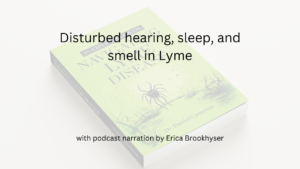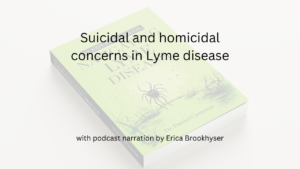Call for your appointment today 914-666-4665 | Mt. Kisco, New York

Welcome to an Inside Lyme case study. I find that the best way to get to know Lyme disease is through reviewing actual cases. In this case study, I will be discussing a 6-week old baby boy with Babesia. This case series will be discussed on my Facebook and made available on podcast and YouTube.
In this episode, I will be discussing a 6-week old baby boy with Babesia.
This case was described in the journal Pediatrics, written by Handel and colleagues in 2019.
The baby boy was seen in an emergency department in Long Island, New York, an area endemic for Lyme disease. The baby spent “minimal time outside,” according to Handel. There was tall grass in the yard and the father painted home exteriors. The parents did not report seeing a tick. Instead, the parents removed a bloody “flea” from his arm 20 days before hospitalization writes Handel
This highlights the difficulties parents can face in recognizing a tick.
[bctt tweet=”Babesia is a parasitic disease that is typically contracted by the same tick that carries Lyme disease.” username=”DrDanielCameron”]
The baby boy with Babesia was irritable, throwing up, not eating well, and had a temperature of 101.1°F. The doctors were initially not able to identify the reason the baby boy was ill or why there was anemia or a low platelet count. The doctors prescribed three antibiotics – ampicillin, ceftriaxone, and vancomycin until they could determine a cause of the illness.
The baby boy was transferred to a second hospital. The blood tests again showed anemia and a low platelet count along with abnormal liver function tests. The spleen appeared large. The laboratory tests now revealed the parasite Babesia in the red blood cells under the microscope. 3.6% of the baby’s red cells showed parasites seen with Babesia.
Babesia is a parasitic disease that is typically contracted by the same tick that carries Lyme disease. Babesia can also be contracted through the blood supply or during pregnancy.
The baby boy with Babesia was prescribed oral atovaquone and intravenous azithromycin. These drugs are marketed as Mepron and Zithromax in the US. The anemia worsened. The hemoglobin dropped to 6.9 gram/dl, which is quite low. The doctors transfused a unit of blood. The doctors were concerned that the baby might also have suffered from Lyme disease. The doctors added 14 days of amoxicillin to the treatment.
The baby remained well on follow-up, according to the doctors.
What can we learn from this case?
- This paper reminds parents of the need to look for tick bites even in babies.
- Babies can be infected with a tick-borne infection even with little outdoor exposure.
- It can be difficult to determine if a baby has Babesia. The baby was not diagnosed with Babesia until transferred to a second hospital and then only because parasites were seen in the blood.
- It can be difficult to be sure a baby does not suffer from Lyme disease. In this case, the doctors elected to treat the baby with amoxicillin in case there was a co-infection. I might have continued azithromycin rather than add amoxicillin, as azithromycin has also been effective in Lyme disease.
What questions does this case raise?
- Would it have been helpful if the parents had recognized the “the bloody flea” as a tick?
- Would the doctor have recognized Babesia if the parasite were not seen in the red cells under the microscope?
- What if the baby girl had evidence of Ehrlichia or Anaplasmosis? If so, the doctors would have to consider doxycycline. Doctors have been reluctant to prescribe doxycycline in young children as the medication may discolor the teeth. The age of which doctors are uncomfortable prescribing doxycycline has dropped to eight. Moreover, the CDC had notified doctors that two weeks of doxycycline is safe in all children up for up to two weeks. I am sure we have not heard the last of this discussion.
- What is the best combination of treatment and length of treatment to prevent long-term complications in children?
- How do you know a baby is well when they cannot communicate how they are feeling? We only know that the parasite Babesia is no longer visible under the microscope.
Treating Tick-Borne Disease
We need more doctors with skills diagnosing and treating Babesia in children. We could use a reliable test to determine who has Babesia and a test to be sure Babesia has resolved. We need to determine the best course of treatment for babies. We hope that if a professional sees a baby that they can use this case to remind them to look for Babesia and treat accordingly.
We also need to give doctors the freedom to treat these difficult cases without undue interference by colleagues, insurance companies, medical societies, and medical boards.
Inside Lyme Podcast Series
This Inside Lyme case series will be discussed on my Facebook and made available on podcast and YouTube. As always, it is your likes, comments, and shares that help spread the word about this series and our work. If you can, please leave a review on iTunes or wherever else you get your podcasts.
Sign up for our newsletter to keep up with our cases.
References:
- Two Neonates With Postnatally Acquired Tickborne Infections Andrew S. Handel, Harriet Hellman and Saul R. Hymes Pediatrics 2019;144;




Twenty five years ago I gave birth to a female baby after multiple episodes of preterm labor. Low birth weight I could tell she wasn’t healthy. Hospitalized at day 10 of life for one week. Treated for “encephalitis “ and discharged home. The sad part is doctors attributed this to my breastfeeding while on Prozac. A paper was published by one of the major Texas universities that Prozac May lead to this condition. I am 62, have post Lyme syndrome and three Lyme positive children who are in denial. Makes me sad as I look back. Her encephalitis was more likely caused by a bacterial infection than pharmaceutical drug. So sad and not good science with what we know now. I’m barely functional and look at my children and grandchild and wonder what their lives will be like
I also have complicated patients in my practice. Thanks for sharing.